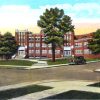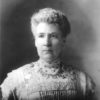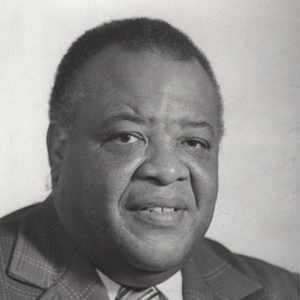calsfoundation@cals.org
Curtis Henry Sykes (1930–2007)
Curtis Henry Sykes was a pioneering educator, community leader, and historian from the Dark Hollow community in North Little Rock (Pulaski County). Remembered as a “champion for justice, equality and motivation,” Sykes served as one of the first black principals in the Little Rock School District in the 1960s before the district became fully desegregated. He was also a driving force in legislation requiring the teaching of African-American history in Arkansas public schools.
Curtis Sykes was born on December 21, 1930, to Clarence Jerrod and Arlene Sykes Jerrod at the home of his grandparents, Lee Andrew Sykes and Ella Sykes, on Pine Street in Dark Hollow. Lee and Ella Sykes adopted Curtis following the death of his mother two years after his birth. Sykes attended Cedar Street Elementary School and Scipio A. Jones High School, where he played football. Following graduation from high school in 1947, Sykes enrolled at Dunbar Junior College in Little Rock (Pulaski County) but was forced to drop out because he could not afford the $10 monthly tuition. Sykes went to work at the Lafayette Hotel and joined the U.S. Army Reserve.
In 1950, Sykes was called up for active duty in the Korean War, which he later recalled as a “blessing in disguise.” Following his honorable discharge as a sergeant in 1953, Sykes qualified for educational benefits, thus beginning a life-long commitment to education. Sykes earned a Bachelor of Science degree in physical education and social studies from Arkansas Baptist College in 1953, a Master of Education from Texas College in 1957, and a Master of Science in Elementary Education from Harding College (which later became Harding University) in 1965, where he was the first African-American graduate.
In November 1955, Sykes married Delois Mitchell of Camden (Ouachita County). The couple had three daughters: Adrienne, Belinda, and Curlethia. The Sykeses were members of the King Solomon Baptist Church in North Little Rock, where Sykes taught Sunday School for over fifty years and was a member of the Board of Trustees.
Sykes devoted thirty-four years to his career as an educator and administrator in Arkansas schools. Following his graduation from Arkansas Baptist, he taught at Woodruff County Training School in Augusta (Woodruff County), where he was promoted to elementary school principal following the completion of his first master’s degree. In 1965, Sykes returned to Little Rock, where he taught elementary school and later was principal of Booker T. Washington Elementary from 1969 to 1978. He then served as principal at Woodruff Elementary, where he was the school’s first black principal, before ending his career in education as assistant principal at Gibbs Elementary in 1985.
Questions about society’s unequal treatment of African Americans fueled Sykes’s lifelong interest in and advocacy of black history. He was a charter member of the North Little Rock History Commission in 1975 and the North Little Rock Historic District Commission 1993, serving on both until his death. He was actively involved in both the Afro-American Historical and Genealogical Society, Inc., Arkansas Chapter, and in PAAC (Preservation of African American Cemeteries, Inc.). In 2005, Sykes was named to a national task force to study the contributions of slaves in building the U.S. Capitol and make recommendations on how those contributions should be honored. The eight-member task force, named by top Republican and Democratic leaders in the House and Senate, also included Senator Blanche Lincoln of Arkansas and Senator John Lewis of Georgia.
Sykes is perhaps best remembered for his leadership of the Black History Commission of Arkansas, established as the Black History Advisory Committee in 1991. He served as chairman of the commission, which functions as an advisory group to the Arkansas State Archives, from 1993 until 2007. In this role, Sykes pushed for legislation to have African-American history taught in Arkansas public schools under Act 326 of 1997. The Black History Commission’s grant fund was renamed as the Curtis H. Sykes Memorial Grant Program with Act 660 of 2009.
Sykes was a tireless civic leader, particularly for the Dark Hollow community where he was born and where he spent much of his adult life. He served as president and chairman of the Dark Hollow Community Development Corporation. Sykes was active in numerous other groups involved with community planning and development and fair housing in North Little Rock.
Sykes was the recipient of many honors during his lifetime and following his death in 2007. He was a life member of the Alpha Phi Alpha fraternity, Inc., Phi Lambda Chapter. In 1998, Sykes received the Community Service Award from the Martin Luther King Jr., Commission, which is given for promoting racial harmony and principals of nonviolence. In March 2008, the Arkansas Historical Association posthumously presented Sykes with the Lifetime Achievement Award. Also, in 2008, a part of 15th Street and the 15th Street exit from Interstate 30 in North Little Rock was renamed Curtis Sykes Drive.
Sykes died on September 9, 2007. He is interred at the Arkansas State Veterans Cemetery.
For additional information:
Curtis H. Sykes Papers (MS.000578). Arkansas State Archives, Little Rock, Arkansas.
“Educator, Historian, Community Mentor.” Arkansas Democrat-Gazette, September 12, 2007, p. 14.
“Icon of City’s African American Community Dies.” Maumelle Monitor, September 14, 2007.
“Longtime Resident Sees Dark Hollow’s Bright Future.” Arkansas Democrat-Gazette, February 4, 1996, p. 1A.
“Out of Slave Labor Came Monuments to Liberty.” Miami Herald, June 12, 2005, p. 1A.
Smith, C. Calvin, ed., Educating the Masses: The Unfolding History of Black School Administrators in Arkansas, 1900–2000. Fayetteville: University of Arkansas Press, 2003.
Lisa Speer
Ouachita Baptist University








Comments
No comments on this entry yet.